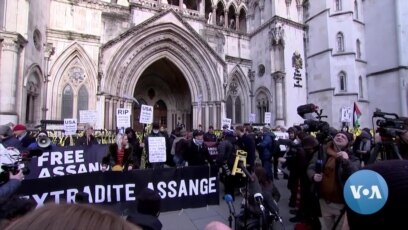Julian Assange’s extradition to the United States has been approved by the UK’s High Court. The verdict overturns a UK court order that had banned Assange’s extradition on the basis that detention in the US would endanger his mental health and raise his risk of suicide.
The US government has provided several assurances to the court including that Assange will not be held in a “supermax” high-security prison during his pre-trial detention or if convicted (unless he “commits any future act that renders him liable to such conditions of detention”), and that the US will allow Assange to serve any final sentence in his native Australia if he so desires.
The ruling marks a huge setback for WikiLeaks co-founder Julian Assange’s efforts to avoid extradition to the United States to face espionage charges, though his attorneys have said they will appeal.
Assange’s fiancée, Stella Moris, called the supreme court decision “dangerous and foolish” and a “terrible miscarriage of justice.”. Assange’s spouse, mother of his two children, and former lawyer, Stella Morris, said they will submit a final appeal with the British Supreme Court, which will only hear the case if it raises a question of law “of general public importance.” This procedure could take weeks or months to complete.

If the Supreme Court of the United Kingdom refuses to hear Assange’s final appeal, he may seek a stay of extradition from the European Court of Human Rights, to whose authority Britain remains subject – a significant legal challenge.
According to US authorities, Assange assisted in the hacking of sensitive information and the publication of hundreds of pages of military records and diplomatic cables related to the wars in Afghanistan and Iraq, endangering the lives of allies.
According to Assange’s supporters, he was working as an investigative journalist who unearthed a goldmine of damaging information regarding American foreign policy. They claim that extradition and punishment will jeopardize American journalistic freedoms.
A British judge concluded in January that Assange should not be extradited to the United States because he would be in grave danger of committing himself.
The US government filed an appeal, claiming that the psychiatrist who examined Assange was biased and that Assange’s mental health was not a bar to his extradition.
Under the Trump administration, Assange was charged with breaching the Espionage Act, marking the first time that federal prosecutors in the United States have targeted not just the source.

Julian Assange’s extradition to the United States has been approved by the UK’s High Court. The verdict overturns a UK court order that had banned Assange’s extradition on the basis that detention in the US would endanger his mental health and raise his risk of suicide.
The US government has provided several assurances to the court including that Assange will not be held in a “supermax” high-security prison during his pre-trial detention or if convicted (unless he “commits any future act that renders him liable to such conditions of detention”), and that the US will allow Assange to serve any final sentence in his native Australia if he so desires.
The ruling marks a huge setback for WikiLeaks co-founder Julian Assange’s efforts to avoid extradition to the United States to face espionage charges, though his attorneys have said they will appeal.
Assange’s fiancée, Stella Moris, called the supreme court decision “dangerous and foolish” and a “terrible miscarriage of justice.”. Assange’s spouse, mother of his two children, and former lawyer, Stella Morris, said they will submit a final appeal with the British Supreme Court, which will only hear the case if it raises a question of law “of general public importance.” This procedure could take weeks or months to complete.
If the Supreme Court of the United Kingdom refuses to hear Assange’s final appeal, he may seek a stay of extradition from the European Court of Human Rights, to whose authority Britain remains subject – a significant legal challenge.
According to US authorities, Assange assisted in the hacking of sensitive information and the publication of hundreds of pages of military records and diplomatic cables related to the wars in Afghanistan and Iraq, endangering the lives of allies.
According to Assange’s supporters, he was working as an investigative journalist who unearthed a goldmine of damaging information regarding American foreign policy. They claim that extradition and punishment will jeopardize American journalistic freedoms.
A British judge concluded in January that Assange should not be extradited to the United States because he would be in grave danger of committing himself.
The US government filed an appeal, claiming that the psychiatrist who examined Assange was biased and that Assange’s mental health was not a bar to his extradition.
Under the Trump administration, Assange was charged with breaching the Espionage Act, marking the first time that federal prosecutors in the United States have targeted not just the source but also the publisher of sensitive information.


